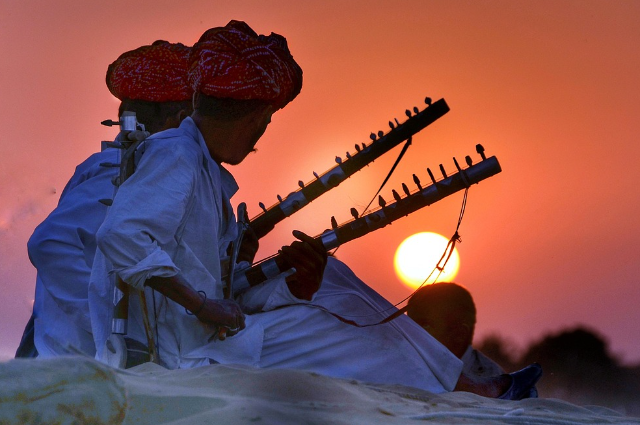
Image by Richard Mcall from Pixabay
Often referred to as the 'Land of Kings', Rajasthan is a state in the northwestern part of India known for its rich and vibrant culture that reflects the heritage and traditions of the region. Spread over vast stretches of arid land, Rajasthan has a unique charm that captures the hearts of locals and tourists alike. This article explores the multifaceted aspects of Rajasthani culture, from traditional art forms to colorful festivals.
Arts and Crafts
- Handicrafts: Rajasthan is a paradise for artisans and its markets boast a staggering array of handicrafts. From intricate handwoven carpets and embroidered textiles to exquisitely carved wooden furniture, the state's craftsmanship is unmatched. Cities like Jaipur are particularly known for their skilled artisans who continue to preserve and promote traditional techniques.
- Miniature Paintings: The state is famous for its miniature paintings, a delicate and detailed art form that is passed down from generation to generation. These paintings often depict scenes from Hindu mythology, royal court life, and nature. With vibrant colors and fine details, miniature paintings of Rajasthan are highly sought after by art lovers.
Architecture
- Palaces and Forts: The landscape of Rajasthan is dotted with majestic palaces and forts that are a testament to its royal history. Amer Fort in Jaipur, Mehrangarh Fort in Jodhpur and City Palace in Udaipur and Jaipur are architectural marvels that showcase the grandeur and opulence of the region's erstwhile rulers. The eclectic architecture of the forts, some up to 20 kilometers in circumference, testify to the power of the Rajput princely states that flourished in the region from the 8th to the 18th century. Enclosed within the defensive walls are major urban centers, palaces, trade centers and other buildings including temples, often predating the fortifications, which developed an elaborate courtly culture that fostered learning, music and the arts. Forts use the natural defenses offered by the landscape- hills, deserts, rivers and dense forests. They are also characterized by extensive water catchment structures, many of which are still in use today.
- Havelis: Intricately designed havelis, or traditional mansions, are another architectural gem in Rajasthan. These structures often contain exquisite carvings, frescoes and latticework. The Patwon Ki Haveli in Jaisalmer is a prime example of the intricate craftsmanship that adorns these historic buildings.
Music and dance
- Folk Music: Rajasthani folk music is a celebration of its rural roots. The soulful melodies of traditional instruments such as the sarangi and dholak accompany the lyrics that tell stories of love, valor and the desert way of life. Known for their musical skills, the Manganiyar community has preserved this heritage for centuries.
- Rajasthani Dance Forms: The state is home to various traditional dance forms, each with its own unique style and meaning. Performed by women during festivals, the Ghoomar dance is a graceful display of swirling skirts and rhythmic footwork. Often associated with the Kalbelia tribe, the Kalbelia dance is a captivating form that mimics the movements of a snake.
Festivals
- Diwali: The festival of lights Diwali is celebrated with great fervor in Rajasthan. Houses and markets are decorated with colorful lights and intricate rangoli designs. The explosion of fireworks and the exchange of sweets creates an atmosphere of joy and unity.
- Pushkar Fair: This annual fair in the city of Pushkar is a vibrant spectacle that attracts people from all over the world. The fair is a celebration of rural life and includes cattle trading, camel racing and traditional Rajasthani performances. It provides an insight into the cultural wealth of the state.
Kitchen
- Rajasthani Thali: Rajasthani cuisine is a wonderful blend of flavors and spices. A traditional Rajasthani thali includes dishes like dal baati churma, gatte ki sabzi and ker sangri pickle. The use of locally available ingredients and aromatic spices gives the cuisine its distinct taste.
- Street Food: Street food in Rajasthan is a culinary adventure in itself. From the famous pyaaz kachori of Jodhpur to the kachoris of Pushkar, the state offers a variety of savory snacks that tempt the taste buds.
Traditions and customs
- Traditional Dress: The traditional dress of Rajasthan reflects the vibrant and colorful nature of the state. Women often wear brightly colored ghagras (skirts) and odhnis (scarves), while men wear turbans and dhotis. The clothing not only adds to the visual splendor but also has practical significance in a dry climate.
- Ceremonial Practices: Rajasthan has preserved ancient ceremonial practices which are an integral part of its cultural identity. From traditional wedding rituals to religious ceremonies, these practices emphasize the importance of family and community bonds.
In conclusion, Rajasthan's culture is a medley woven with threads of history, art, music and traditions. The state's commitment to preserving its cultural heritage while embracing modernity is evident in its bustling cities and tranquil countryside. Whether you're exploring the vibrant markets of Jaipur or witnessing a traditional dance performance in Jaisalmer, every corner of Rajasthan tells a story of resilience, royalty and rich cultural heritage.
